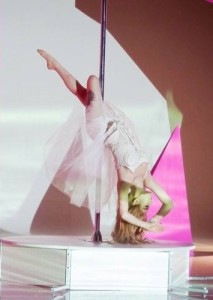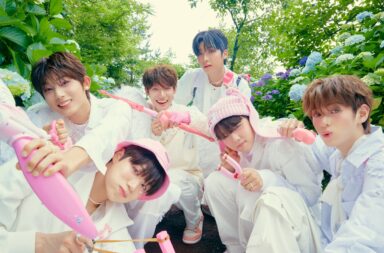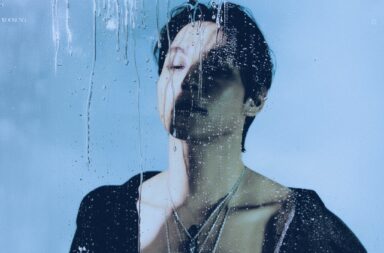 After School is back with their 6th maxi single and eye-catching MV, “First Love.” Pledis has pulled out all the stops, teaming up again with Brave Brothers to produce the title track and putting the girls through a six-month pole dance training process for the video. While the girls’ efforts are impressive, “First Love” is a mixed bag in both maxi and MV, leaving After School’s talents and versatility underutilized.
After School is back with their 6th maxi single and eye-catching MV, “First Love.” Pledis has pulled out all the stops, teaming up again with Brave Brothers to produce the title track and putting the girls through a six-month pole dance training process for the video. While the girls’ efforts are impressive, “First Love” is a mixed bag in both maxi and MV, leaving After School’s talents and versatility underutilized.
The album starts off with intro track “8 Hot Girl.” Intro tracks should work as a preview to the album, but unfortunately, “8 Hot Girl” does not do that because it doesn’t feature After School. Maboos tells us that After School is going to show us something “really, really sexy,” but we don’t get to experience it. While Chakun’s falsetto is fine, there are indeed eight hot girls that could have sung the intro and given a more satisfying appetizer to the main course.
Next is title track “First Love,” which is a slower, cooler song akin to ‘90s R&B. While the song has groove potential, the main problem with “First Love” is that it sounds so much like Brave Brothers’ recent releases, particularly Sistar19’s “Gone Not Around Any Longer.” From the amusing electronic sax, to the vocal “na nas” that sound like the “hoo hoos,” there’s not much to separate the two musically. Despite After School having worked with Brave Brothers four years ago with “Because of You,” Sistar has co-opted the current Brave Brothers’ sound, making comparisons inevitable. It’s understandable why Pledis would want the hit maker to produce for them, but in their attempt to make After School stand out, they’ve unfortunately created a song that cannot be talked about without mentioning another girl group.
[youtube http://www.youtube.com/watch?v=zmS3Qh_SFwU&w=560&h=315]“First Love” doesn’t exhibit much vocal variety, but the girls’ higher ranges and soft tones do work in the overall context. The lyrics talk about missing a first love, and combined with their breathy voices creates a vulnerable atmosphere. The song sounds like it will pick up with the addition of the turntable effect before the second verse, but that cuts out too soon. This little glimmer shows how “First Love” could have been; it begs for play of some sort, whether it be through vocals or sound effects, but nothing comes in to add interest. This is particularly frustrating considering After School has the mix of vocal ranges to make the song more dynamic.
What the song lacks in variety, the MV makes up for in visual stimulation. The big concept behind the MV is pole dancing, which falls in line with other physically difficult tasks After School has done. One thing I greatly appreciate about After School is that they really commit to their concepts through training. The pole dancing could have been done without much effort, which probably would’ve delivered lackluster choreography, but the girls stepped it up and the result is stunning. Not only do they show some impressive acrobatics, but also the slow spinning flows in an almost hypnotic way, enhancing the music.
 However, the issue with the pole dancing is that it doesn’t tie-in with the song’s theme. Beyond looking cool and sexy, there’s nothing about the song that suggests it. Clearly, Pledis wanted to try something showy for this release and not think about song-video cohesion. With so much competition, using an attention-grabbing concept is valid, but it makes for a less tight package. One half is a longing for first love, and the other half is straight up pole dancing. Props to them for executing it well, but it’s still pole dancing for pole dancing’s sake.
However, the issue with the pole dancing is that it doesn’t tie-in with the song’s theme. Beyond looking cool and sexy, there’s nothing about the song that suggests it. Clearly, Pledis wanted to try something showy for this release and not think about song-video cohesion. With so much competition, using an attention-grabbing concept is valid, but it makes for a less tight package. One half is a longing for first love, and the other half is straight up pole dancing. Props to them for executing it well, but it’s still pole dancing for pole dancing’s sake.
The part that visually represents the song well is the individual shots of the girls looking almost naked. In these shots they appear vulnerable and emotional, reflecting the song’s lyrics. Another nice feature is the dance itself, which hits all the sexy, sultry points, but where the moves also flow into each other and happen seamlessly, showing full dance phrases rather than only hip rolls. They took full advantage of utilizing levels, from the floor to the platforms to the poles, which makes the dance as complex and interesting as the acrobatics. But while the physical feats are great, the styling leaves much to be desired. The girls have the black leather outfits, the inexplicable Union Jack outfits and the white outfits. Add in the garish main set and weird purple lattice room, and the overall look ends up messy and tacky, detracting from the choreography.
After “First Love,” we get a streak of three really solid songs. “Dressing Room” is a club beat that could have been their comeback single. An electronic mix that also plays on ’90s sounds, it’s like a poppified mix of house and trance. The song exhibits a nice back and forth between building up and down, through heavy guitar chords and dreamy vocals. The girls show full vocal dynamics and go from soft to powerhouse, crescendoing beautifully with the repeated “I’m changing love” at the end. No electronic effect or instrumentation goes on too long or too short, making the song a varied, stellar B-side.
[youtube http://www.youtube.com/watch?v=lJF7xkG7ov0&w=560&h=315]“Time’s Up” gives listeners an upbeat pop song that’s a welcome break after the darker sounding ones. While still relying on synth, the song has a fresh and restrained feel due to the intertwined piano. This also allows the girls’ vocals to take center stage, and the song stretches their ranges from low to high and brings out their emotive abilities. The rap works to build and drive the song home, making it appropriate rather than obligatory.
“Love Beat” is quite heavy on the distortion, which blocks the girls’ voices. However, the strong, steady rhythm works to get listeners up and dancing. It doesn’t have the musical play of “Dressing Room,” but it delivers a solid, addictive song that doesn’t quit building until it’s done. The album finishes with “Makeup & Tears,” a Jungah and Raina duet. It is a standard, pretty ballad, and while it won’t be everyone’s cup of tea, it does give the main singers the spotlight.
In First Love, there are consistent musical threads that tie the album together, such as electronic play, prominent builds and breakdowns, and repeated vocal lines. While tracks three through five show great cohesion, the intro and ending songs don’t quite fit, and the title track suffers from Brave Brothers syndrome. The MV has beautiful choreography and pole dancing visuals, but the styling doesn’t complete the song nor does the concept make sense within its context. However, while not without flaws, this comeback proves that After School pulls off the difficult image of being a truly versatile group with their concepts. 3.5/5.
Readers, what do you think of the MV and album?


